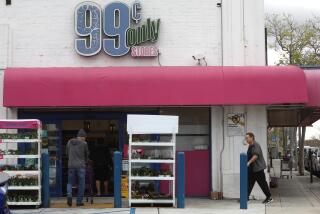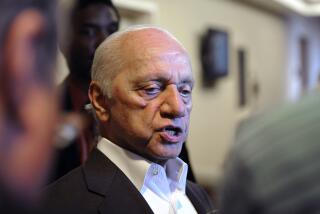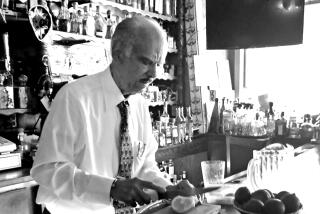Melvin Simon dies at 82; shopping center magnate
Melvin Simon, who started what is now the country’s largest shopping mall company and owned the NBA’s Indiana Pacers with his brother, died Wednesday in Indianapolis, a spokesman said. He was 82.
Les Morris, a spokesman for Simon Property Group, which Simon spent nearly 40 years leading, confirmed Simon’s death but said he could not discuss the circumstances. Simon had not made any public appearances in recent months.
Simon Property Group has full or partial ownership of more than 300 shopping malls in the United States, Europe and Japan. Simon’s interests extended to politics -- he and his wife were major Democratic Party donors -- and to Hollywood, where he was best known for producing the raunchy teen comedy “Porky’s.”
But Simon’s main business was building and operating enclosed suburban shopping malls across the country, netting him a fortune that Forbes magazine estimated this year at $1.3 billion. Among the company’s Southern California locations are the Del Amo Fashion Center, Brea Mall, the Shops at Mission Viejo and outlet malls in Camarillo, Cabazon and Carlsbad. The company also owns the Forum Shops at Caesars Palace in Las Vegas.
The son of a tailor, Simon was born Oct. 21, 1926, and grew up in the Bronx. He arrived in Indianapolis in the 1950s when he was stationed at the Army’s Ft. Benjamin Harrison and entered the commercial real estate business in the city after his discharge.
“I enjoyed it, but in a couple of years I decided I wanted to be the person to make the decisions,” Simon told Indiana Business magazine in 1991. “That’s how we got into developing.”
He started Melvin Simon & Associates with his younger brother, Herbert, in 1960, first concentrating on strip centers anchored by grocery stores and pharmacies. The scale of the projects grew until the company opened the Mall of America in a Minneapolis suburb in 1992 -- running the mega-mall until selling its interest in 2006 -- and the Circle Centre Mall in downtown Indianapolis in 1995.
The Simon brothers were credited with keeping professional basketball in Indianapolis when they bought the Pacers in 1983 at the behest of city leaders to head off a deal that could have seen the team move to Sacramento.
The Pacers were coming off a 20-62 season and averaged home crowds of fewer than 5,000 fans when the Simons bought the team.
They promoted Donnie Walsh from assistant coach to general manager three years later and largely gave him control of the team for some 20 years. Led by star players Reggie Miller and Jermaine O’Neal, the Pacers reached the Eastern Conference finals six times in 11 years and the NBA finals in 2000, losing in six games to the Lakers.
The team’s success led to the construction of Conseco Fieldhouse, which opened in 1999.
The Simon family has remained the largest shareholder in Simon Property Group, and when the founding brothers stepped down as co-chairmen in 2007, they turned the chairmanship over to Melvin’s oldest son, David, who had been chief executive since 1995.
Simon and his second wife, Bren, a former member of the Democratic National Committee, were known for their philanthropic efforts. Among their major gifts were $50 million for Indiana University’s cancer center, $10 million to the Indianapolis Museum of Art and $2.1 million toward an Indiana University music center that was named for his first wife, Bess Meshulam Simon.
Besides his wife Bren, son David and brother Herbert, Simon is survived by daughters Deborah Simon, Cindy Simon Skjodt and Tammy McCauley, as well as 10 grandchildren and another brother, Fred. Another son, Max, died in 1999 at age 25.
As a Hollywood movie producer, Simon said he was “absolutely flabbergasted” when “Porky’s” -- with its scenes of teenage boys spying on girls in a locker room shower and visiting a brothel -- became a big hit in 1982.
“I did about 25 movies and I got out of it, thank God -- it didn’t cost me any money ultimately,” Simon told the Indianapolis Star in 2002. “It was a good lesson, and I wouldn’t do it again.”
More to Read
Start your day right
Sign up for Essential California for the L.A. Times biggest news, features and recommendations in your inbox six days a week.
You may occasionally receive promotional content from the Los Angeles Times.






